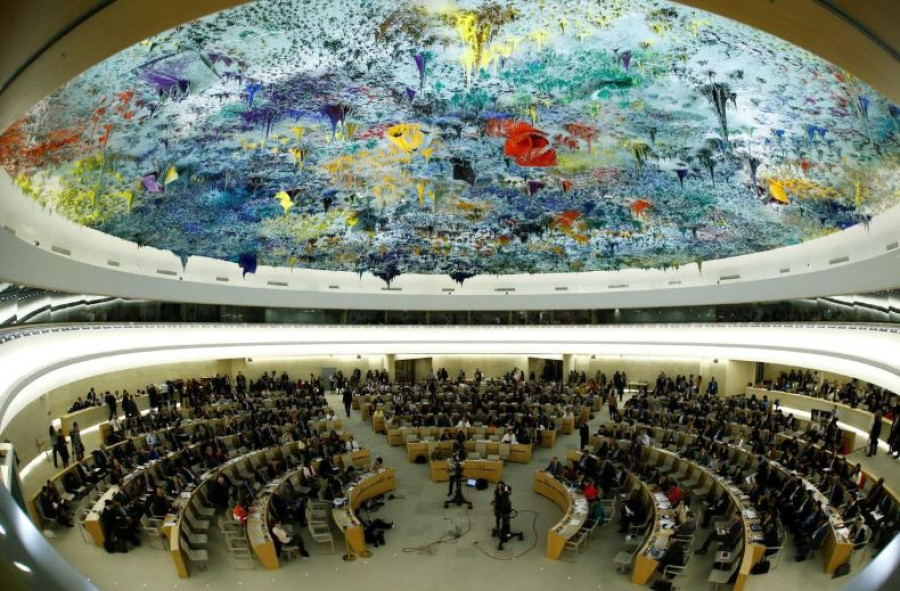National
Nepal likely to face host of questions in its bid for another UN rights council term
But officials say the country is one of the best performers among the present members of the council.
Binod Ghimire
Nepal made several pledges to improve the situation of human rights in the country when it ran for member of the UN Human Rights Council for the 2018- 2020 tenure. As it completes its three-year term in a few months, most of its commitments remain unimplemented which, according to rights defenders, could pose a challenge for the government’s aspiration to contest for the position for a second term.
The government has already submitted its pledges to the United Nations as it faces elections for the next three-year term in November. However, a majority of the pledges are a repetition of the commitments made in 2017, which Nepal has failed to implement.
“It would be a matter of pride if Nepal gets elected for another term,” said Bed Bhattarai, secretary and spokesperson at the National Human Rights Commission. “However, there is no excuse for not implementing previous commitments.”
The UN Human Rights Council is responsible for promoting universal respect for the protection and promotion of human rights and fundamental freedoms for all, considering human rights violations and making recommendations thereof; and promoting coordination of human rights within the UN system. The members of the council bear a responsibility of building pressure on the UN members to abide by human rights principle.
Nepal presented a host of pledges in view of the objectives of the council to the voters to get elected to the council. Providing justice to thousands of victims of the decade-long Maoist insurgency, implementing the recommendations of the National Human Rights Commission and strengthening its capacity, and addressing gender-based violence and caste-based discrimination were the major commitments Nepal made when it ran for the position in 2017.
During the election, the government had also vowed to address impunity, equip the inclusion commissions to work towards empowering the marginalised communities and further promote freedom of expression.
However, these commitments remain largely unimplemented, say experts adding that some countries may raise this issue when Nepal starts lobbying for re-election.
The UN says every member state should take into account the contribution of the candidates towards the promotion and protection of human rights before the voting and the members elected should uphold the highest standard in the promotion and protection of human rights.
“Nepal will not have the moral authority to press other countries to respect human rights if its own track record on the issue is poor,” said Gauri Pradhan, former member of the National Human Rights Commission. “The issue of Nepal’s track record will be raised, mainly by the European nations, once Nepal starts to lobby for the post. That could pose a challenge for re-election.” He said every country aspiring to claim a seat in the council must have a strong record of accomplishments.
Contrary to its commitment towards empowering the constitutional human rights watchdog, the government has registered a bill to amend the National Human Rights Commission Act in Parliament with provisions to curtail its authority. Similarly, the government remains reluctant to implement its recommendations—only 12 percent of them are fully implemented.
That the commission is still based in a makeshift structure, five years after the devastating earthquake, also weakens Nepal’s case, say rights defenders.
The government has also not taken any concrete steps towards ensuring justice for thousands of the victims of the Maoist insurgency. Despite its commitment to do so, the transitional justice Act has not been amended while the two transitional justice commissions have failed to do their jobs.
Cases of extrajudicial killings continue to surface, and culprits of such crimes aren’t booked, critics say. Similarly, cases of caste-based discrimination and gender-based violence are also being reported in the media.
In addition to that, various rights enshrined in the constitution have not been implemented. The government, despite repeated commitments to give full shape to the seven inclusion commissions, hasn’t done so yet.
Despite the shortcomings, Nepal just may get elected to the council, critics say, but the path ahead won’t be easy for its diplomats. “Nepal might get elected for a second term, but moral questions regarding its track record will always follow it unless it complies with its commitments,” advocate Govind Bandi, who specialises in human rights, told the Post.
Though facts speak for themselves, officials say Nepal is among the best performers in human rights among current members of the council.
Bharat Raj Poudyal, spokesperson for the Ministry of Foreign Affairs, Nepal has implemented almost every commitment it made during the previous election. “We are among the best performers when it comes to implementing commitments made during the elections,” Poudyal, who also leads the UN division, told the Post. “The government is sincerely implementing recommendations from the human rights commission while also respecting its commitments to human rights.”




 8.79°C Kathmandu
8.79°C Kathmandu















